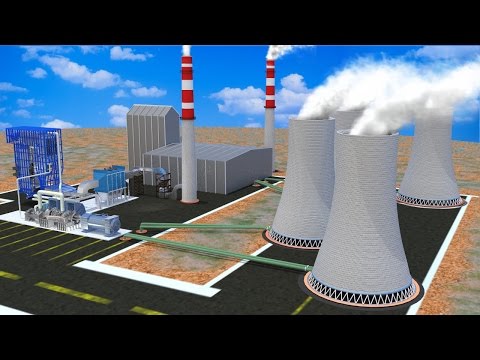Lucrative Power Plant Engineering Jobs: Salary & Responsibilities

Power Plant Engineering Job Description Template
Power Plant Engineering involves the design, development, construction, and operation of power plants that generate electricity. Power plants are vital infrastructures that convert various forms of energy, such as fossil fuels, nuclear, solar, wind, or hydro, into electrical energy that can be used for various purposes. A power plant engineer is responsible for overseeing the entire process of power plant operations. They are involved in designing and developing the plant’s layout and systems, ensuring efficient energy conversion, and ensuring compliance with safety and environmental regulations. They also conduct feasibility studies to assess the viability of new power plant projects and make recommendations for improvements. Technical expertise is crucial for power plant engineers. They must have a deep understanding of thermodynamics, heat transfer, fluid mechanics, and electrical systems. They use this knowledge to analyze and optimize the performance of power plant components, such as boilers, turbines, generators, and cooling systems. In addition to technical skills, a power plant engineer should possess strong problem-solving and decision-making abilities. They must be able to identify and resolve operational issues, such as equipment failures, and implement preventive maintenance measures to minimize downtime. They also need to stay updated with the latest advancements in power plant technology and industry standards. Safety and environmental consciousness are paramount in power plant engineering. Engineers must ensure that power plants operate in compliance with safety regulations and take measures to minimize pollution and environmental impacts. They may also be involved in implementing energy conservation initiatives and exploring renewable energy options. In summary, a power plant engineer plays a crucial role in the design, operation, and maintenance of power plants. Their technical expertise, problem-solving skills, and commitment to safety and sustainability are essential for ensuring the reliable and efficient generation of electricity.Power Plant Engineering Responsibilities
Power Plant Engineering Requirements
How Much Does A Power Plant Engineering Make?
Power Plant Engineering Salary
| Job Title | Salary Range |
|---|---|
| Power Plant Engineer | $70,000 – $120,000 per year |
| Senior Power Plant Engineer | $90,000 – $150,000 per year |
| Power Plant Manager | $100,000 – $200,000 per year |
Power Plant Engineering is a highly specialized field that involves the design, construction, operation, and maintenance of power plants. Professionals in this field play a crucial role in ensuring the efficient and reliable generation of electricity. As a result of their expertise and responsibilities, power plant engineers, senior power plant engineers, and power plant managers are compensated with competitive salaries.
The salary range for power plant engineers typically starts at around $70,000 per year and can go up to $120,000 per year. Senior power plant engineers, with more experience and advanced knowledge, can earn between $90,000 and $150,000 per year. Power plant managers, who oversee the entire operation and have significant managerial responsibilities, can earn salaries ranging from $100,000 to $200,000 per year.
It is important to note that salaries can vary depending on factors such as location, company size, and years of experience. Additionally, professionals in this field may also receive benefits such as bonuses, healthcare, and retirement plans.
Overall, a career in power plant engineering can be financially rewarding, offering competitive salaries and growth opportunities for individuals with the necessary skills and expertise.
Power Plant Engineering Salaries by Country
Top Paying Countries for Power Plant Engineering
| Country | Average Salary (in USD) |
|---|---|
| United States | 120,000 |
| Switzerland | 110,000 |
| Germany | 100,000 |
| Australia | 95,000 |
| Canada | 90,000 |
Power Plant Engineering professionals are highly sought after worldwide due to their expertise in designing, operating, and maintaining power plants. The salaries in this field vary greatly depending on the country. According to recent data, the United States offers the highest average salary for Power Plant Engineers, with an average of $120,000 per year. Switzerland follows closely with an average salary of $110,000, while Germany offers an average of $100,000. Australia and Canada also provide lucrative opportunities for Power Plant Engineers, with average salaries of $95,000 and $90,000, respectively.
A video on the topic Power Plant Engineering
Video Source : LesicsInterview Questions for Power Plant Engineering
1. What is power plant engineering?
Power plant engineering is a branch of engineering that deals with the generation, transmission, and distribution of electric power. It involves designing, operating, and maintaining power plants to ensure efficient and reliable power production.
2. What are the main types of power plants?
The main types of power plants include thermal power plants, hydroelectric power plants, nuclear power plants, and renewable energy power plants such as solar and wind power plants.
3. How does a thermal power plant work?
A thermal power plant uses fossil fuels (such as coal, oil, or natural gas) to heat water and produce steam. The steam drives a turbine connected to a generator, which produces electricity. The waste heat from the combustion process is also used to generate steam, thereby increasing the overall efficiency of the plant.
4. What are the advantages of hydroelectric power plants?
Hydroelectric power plants have several advantages, including renewable and clean energy generation, long lifespan, low operating costs, and the ability to store water for future use.
5. What are the main components of a nuclear power plant?
The main components of a nuclear power plant include the reactor, steam generator, turbine, condenser, and generator. The reactor uses nuclear fuel (such as uranium) to produce heat through a controlled nuclear reaction, which is then used to generate steam and produce electricity.
6. What are the challenges faced in power plant engineering?
Some of the challenges faced in power plant engineering include environmental concerns related to emissions and waste disposal, ensuring plant efficiency and reliability, managing power grid integration, and adapting to changing regulations and technologies.
7. How does a solar power plant work?
A solar power plant uses photovoltaic cells to convert sunlight directly into electricity. These cells are made of semiconductor materials that produce an electric current when exposed to sunlight. The generated electricity is then fed into the power grid or stored in batteries for later use.
8. What is the role of power plant engineers?
Power plant engineers are responsible for designing, operating, and maintaining power plants to ensure efficient and reliable power generation. They analyze energy requirements, develop plant layouts, oversee construction and installation, monitor plant performance, and troubleshoot any issues that may arise.
9. What are the advantages of renewable energy power plants?
Renewable energy power plants, such as solar and wind power plants, have several advantages. They produce clean and sustainable energy, reduce dependence on fossil fuels, lower greenhouse gas emissions, and contribute to the overall environmental sustainability.
10. What is the future of power plant engineering?
The future of power plant engineering lies in the development and implementation of advanced technologies, such as advanced gas turbines, energy storage systems, and smart grid integration. There will also be a continued focus on renewable energy sources and the need to address environmental concerns in power generation.






